In the article What Do Mass Shooters Believe?, writer Isaac analyzed the ideology of the mass shooters with 10 or more victims. The results are interesting and are worth delving into further.
The Data
The following graph shows the ideologies of the shooters:
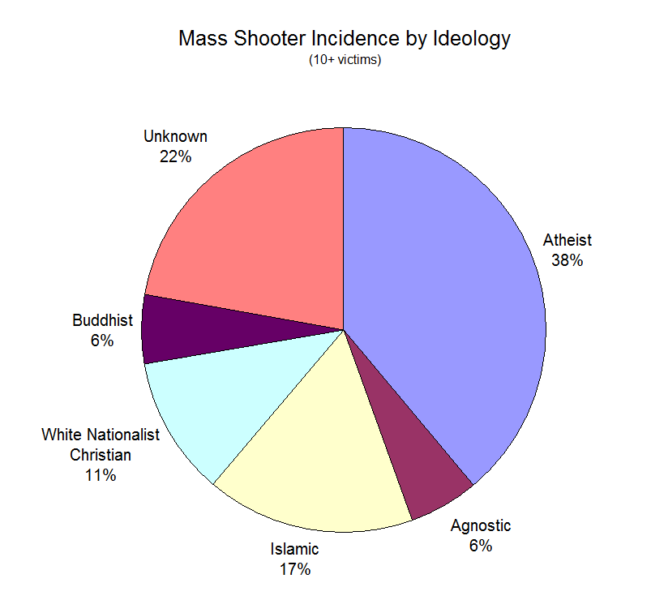
Of the 18 mass shooters with 10 or more victims, 7 were atheist. This represents 38% of the total number of shooters, by far the highest represented ideology. If we treat atheists and agnostics as a related ideology (don’t positively believe in God), then this number is 44%.
The following graph shows the number of victims by the ideology of the shooters:
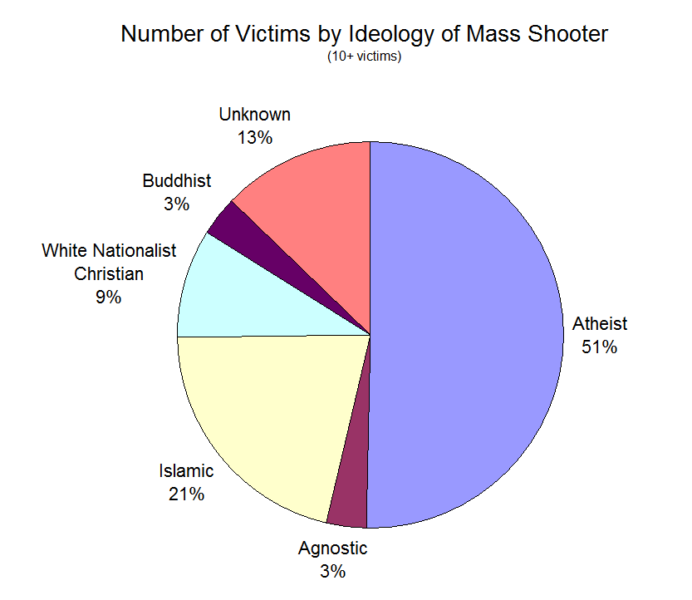
Mass shootings by atheists and Muslims disproportionately create more victims than other ideologies.
The Analysis
The raw data shown above indicates that there may a relationship between certain ideologies and mass shootings. In order to analyze this, it’s important to weight the data according to each ideology’s representation in the total population. In the general population, Christians make up about 74%, atheists 3%, agnostics 4%, Buddhists 1%, and Muslims 1%. Weighting the data yields the following result:
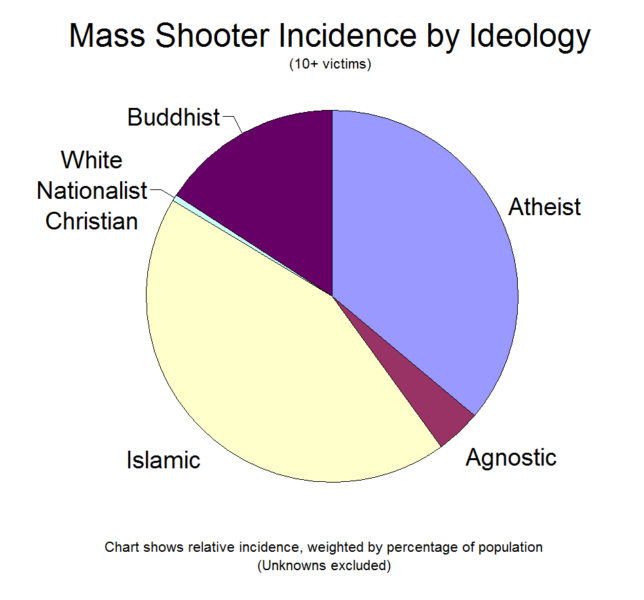
This chart shows the likely ideology of a mass shooter given equal populations of each group. Atheists and Muslims stand out as having a disproportionately high incidence, while Christians stand out as having a disproportionately low incidence.
It’s fair to consider what those 22% unknowns would do to the proportions if we knew they were a member of one group or another. Let’s arbitrarily assign all of the unknowns to Christians and see what happens:
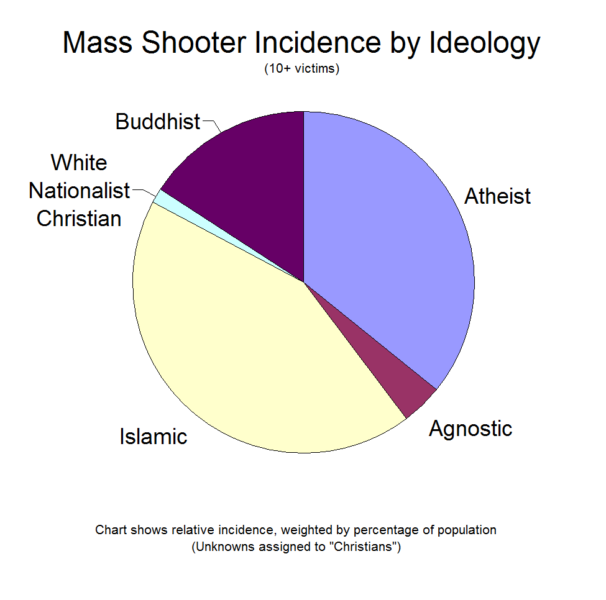
The effect is insignificant. There are just too many Christians in the America for the small number of Christian mass shooters to impact the likelihood that any given Christian will be a mass shooter compared to other ideologies. Christians have significantly below average incidence of mass shooters given the size of their population. Indeed, Muslims are 100 times more likely than Christians to be a mass shooter than Christians, while atheists are 80 times more likely than Christians to be a mass shooter.
Now look what happens when we assign all of the unknowns to Atheists, the group most represented in the raw numbers:
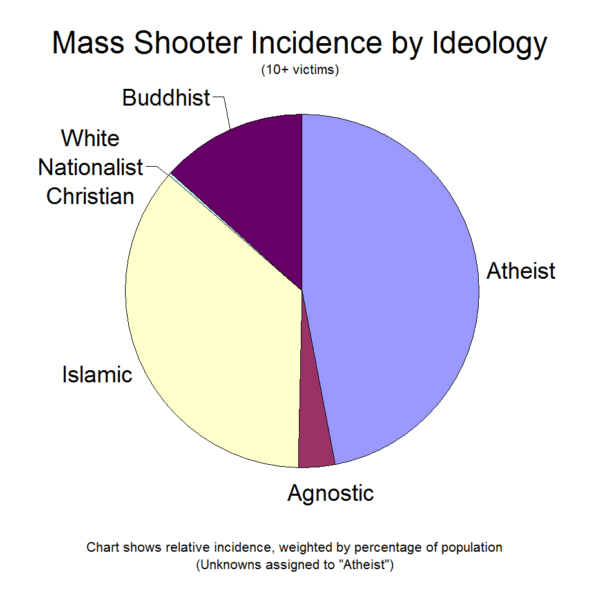
If the unknowns turned out to be atheist, this would mean that atheists are 130 times more likely than Christians to be mass shooters. Given the distributions we do know, atheists may be underrepresented in the statistics.
Questions
The analysis leads to many follow-up questions.
We know that the rise in mass shootings over the last few decades coincides with a corresponding decline in Christianity. Could it be that the decline in Christianity and the rise in other ideologies is, at least partially, responsible for the rise in mass shooting?
Why have mass shootings risen in overall incidence as overall access to guns has declined?
Is there something about Islam that encourages mass shootings?
Is there something about not positively believing in God that contributes to mass shootings?
What is it about Christianity that leads it to be so relatively peaceful?
Is there a relationship between religious and political ideologies in mass shooters?
Is there a relationship between religious ideologies of mass shooters and mental illness?
Is there a relationship between religious ideologies of mass shooters and broken families?
Notes
The Christian shooters represented were all white nationalists. It is not clear to what extent their Christianity (if anything) contributed to their mass shooting. There are two ways to approach this:
- We can lump their Christianity in with all other Christians. This avoids the “No True Scotsman” fallacy. If we do this, we find that Christianity as a whole is significantly more resilient to these acts of violence than other ideologies. This is the general approach taken here.
- We can distinguish between Christians who follow Jesus’ commands to live peacefully and those who do not. This would result in a disproportionate representation of White Nationalists (i.e. extremist Christians) in the statistics, but decrease the incidence of the normative Christian. It would also open the door to discussions on the impact that the philosophies and doctrines of Islam and Atheism have on mass shooting incidence. As originally noted: “Nearly the entire list is composed of people holding to just 4 fringe ideologies: nihilist atheism, occultism, white nationalism, and Islamic extremism.”

Of course, they may also have been Manchester United supporters, or left-handed, or own a pet hamster.
Atheism and being left-handed are positively correlated. Being atheist is—at the population level—suggestive of higher mutational load (i.e. lower genetic fitness).
Treating mass shootings as statistical noise is also a rational take: so rare relative to the size of the population that they are not worthy of society taking notice. I can understand why you’d make that argument. Can you imagine mainstream media, leftist politicians and voters, or anti-theists being this rational? I can’t.
I believe that this is an important and relevant analysis. Too few people care about root causes and only focus on prevention of the effects (“It’s the guns!”). Arkenaten’s response is a typically shallow dodge. What could be more meaningful in looking for behavioral causes than the very worldview that someone holds. Atheists are certainly quick to ascribe Christianity to anything bad that “Christians” do.
Your questions and followup notes are also important. One might go even deeper and ask what life factors contribute to shaping one’s worldview. I have seen other surveys of shooters that indicate that the majority are from broken homes and/or have poor relationships with their fathers. I have also read books, like “Intellectuals,” which survey the live’s of the worlds great atheists and progressives, and this same theme seems to be echoed in their lives as well. I would love to see systematic studies that look at correlations between upbringing and worldview. Again, atheists are certainly comfortable speculating on the psychological causes for believing in Christianity.
The unfortunate thing is that in these kinds of statistics, “Christianity” is always lumped into a large, ill-defined bucket. You’ve rightly pointed out that most of the US population could be categorized as “Christian.” However, that is such a vague category as to be meaningless. I would hope for at least 3 different categories. 1) cultural Christians, who simply identify as such, but don’t really know Christian theology and seldom if ever attend church. 2) liberal Christians, who consciously reject classical Christian theology. 3) conservative Christians, who understand at least the basics of classical Christianity and accept it. Of course, it would be nice to further break down group 3 into those who are demonstrably committed to this belief. I’d wager we’d find, for example, few to none of the mass shooters who’d just come from a Wednesday night Bible study. For my part (as an amateur apologists), I have no interest in defending anything but category 3.
Welcome, and thank you for your comment. It is insightful.
I noted this problem when I wrote about Christianity and Divorce. Researchers simply don’t take the time to break this down at the level required. If you broke it down into the county level, you’d have to find 3,000 different county-level religious statistics, with their own methods for counting, and some not doing the counting at all.
When I looked at the Glass/Levchak study on divorce, I noted that they singled out the highly unsuccessful Southern Baptists in order to say that most Christian conservative evangelicals have high divorce rates. I looked at the raw data and compared it with published state and county records and noted that the highly successful Anabaptists (e.g. Lancaster County, Pennsylvania) were classified as Mainline Protestants, not Evangelicals or Conservatives. Imagine the absurdity of classifying the Amish or Mennonites as Mainline Protestant.
It is for this reason that I am highly skeptical of these researchers. At best, their research is only a cursory examination.